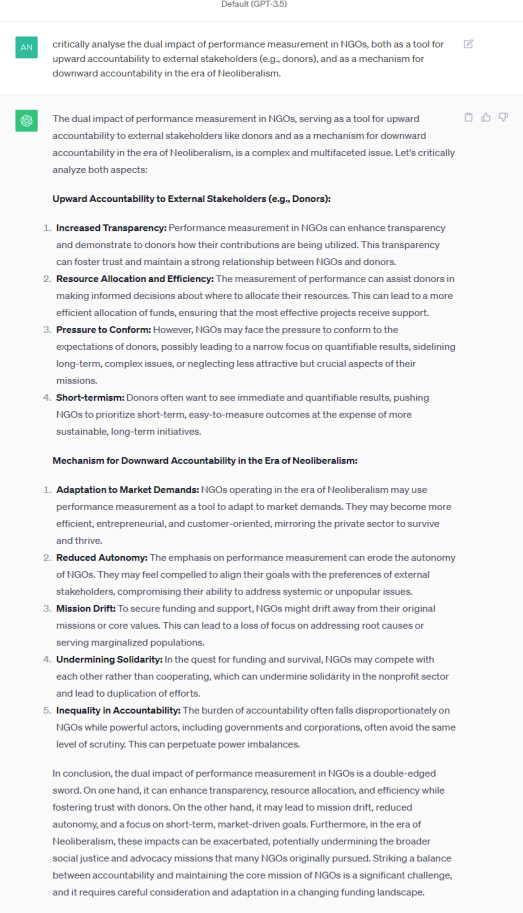Individual Coursework (80%)
BE133-6-SP - Critical Debates in Accounting
2023-2024 - Spring
Coursework assignment
Critically analyse the dual impact of performance measurement in NGOs, both as a tool for upward accountability to external stakeholders (e.g., donors, private foundations, other funders), and as a mechanism for downward accountability (e.g., beneficiaries) in the era of neoliberalism.
On the next page you will find the answer provided by ChatGPT (GPT 3.5, https://chat.openai.com/). You are required to evaluate the ChatGPT draft and compose an essay that further develops it.
You should provide evidence of academic literature (i.e., academic journal articles and books), practitioner research (e.g. research reports published by professional accountancy institutions), and media articles (e.g. articles published in newspapers like The Guardian) supporting and extending ChatGPT draft. To do so, rely on the broader discussion of neoliberalism impacting accounting practices and bring examples on how donor expectations influence the performance measurement practices of NGOs and how the choice of performance measurement tools (e.g., Key Performance Indicators) can facilitate or hinder accountability practices at different levels and lead to potential unintended consequences in this context. Finally, you should critically consider how to change practices that negatively affects upward/downward accountability.
Marking scheme for the coursework is as follows:
The coursework will be marked on the following the EBS Marking Scheme criteria:
• Structure: Clear, coherent, structured (i.e., signposted) and concise presentation of arguments and ideas. Correct referencing.
• Coverage: Evidence of in-depth knowledge and understanding. Critical evaluation of relevant theoretical concepts and ideas. Ability to synthesise, integrate and evaluate material from a variety of appropriate sources.
• Analysis: Evidence of critical analysis and evaluation with reference to relevant theoretical ideas and debates. You should go beyond ChatGPT answer, i.e., to move beyond the first draft to make your essays better. Analytical focus rather than descriptive focus. Self- reflectiveness and attempt to contribute own thoughts.

Figure 1. ChatGPT draft answer
IMPORTANT
- Your discussion should integrate the findings of at least 6 academic papers/books that have been published on this topic and alternative sources, such as media articles and reports by national and international organisations and NGOs.
- Your discussion should incorporate real-life examples to illustrate the points being made.
- Note that this coursework invites you to reflect and provide arguments on the topic based on your own research. The essays that are well researched will normally attract a higher mark than those that are not. In particular, consider papers from journals such as:
• Critical Perspectives on Accounting;
• Management Accounting Research;
• British Accounting Review;
• Accounting, Organizations and Society;
• Journal of Management Accounting Research;
• Contemporary Accounting Research;
• Financial Accountability & Management;
• European Accounting Review;
• Accounting, Auditing & Accountability Journal.
- Essays should not exceed 3,000 words (excluding list of references, tables/pictures and appendices).
- You must indicate total word count on the first/cover page.
‐ Essays must be typed with 12pt Arial or Times New Roman font, double spaced.
‐ Essays should be written in an appropriate academic format. The following structure is suggested:
o Introduction (max 500 words) – i.e., what is the key focus/argument of your essay?
o Body (max 2,000 words) – i.e., ideas and elaboration with appropriate sub-headings
o Conclusion (max 500 words) – i.e., overall reflection on the topic and concluding argument
‐ You should ensure that you have fully acknowledged the work of others in the body of the text. Ensure that you provide complete references for articles, books and other sources that you have cited in the body of your essay. You may refer to “EBS Student Resources”
https://moodle.essex.ac.uk/course/view.php?id=4454
‐ The essay must be submitted to the Online Course Submission (OCS) Server (FASER), by 10.00 AM of 4th March 2024.
- All coursework will be anonymous (unless otherwise specified in the ‘Assessment’ section of this module outline), so you should ensure that only your registration number is included in the header.
- Under the University’s zero tolerance rules, late work will receive a grade of ZERO. More information concerning late submission of coursework or absence from in-class tests, can be found here:
https://www1.essex.ac.uk/students/exams-and-coursework/late-submission.aspx
‐ University Regulation 6.21: It is an academic offence for a student to engage in unfair academic practices or to cheat in any examination, or in any other submitted part of his or her University work, whether or not such work is formally assessed. A student maybe found guilty of an academic offence whether or not there has been intention to deceive; that is, ajudgement that negligence has occurred is sufficient to determine guilt. See more information of academic offences here:
http://www.essex.ac.uk/about/governance/regulations/affairs.aspx#cheating
‐ Students requiring support may contact EBS learning team: [email protected]